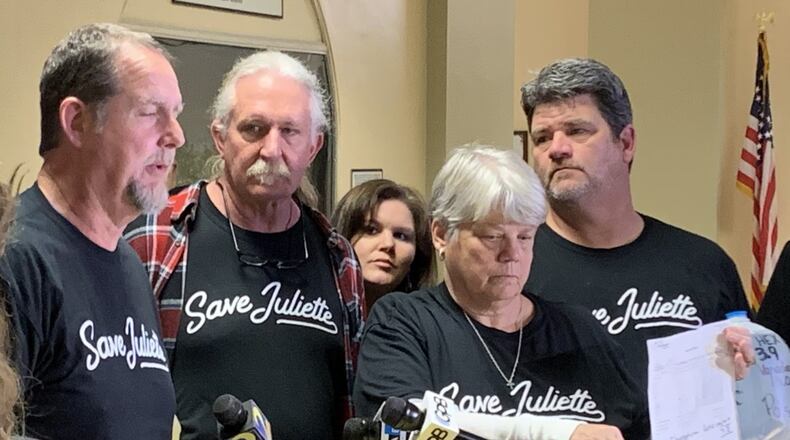About 70 residents of Juliette arrived at the state Capitol on Monday morning wearing “Save Juliette” T-shirts and clutching bottles of discolored water. They came with hopes of connecting with members of the assembly and communicating a single message: Coal ash sitting in the groundwater at Georgia Power’s Plant Scherer is impacting their lives, and they want lawmakers to do something about it.
“It has been an ongoing issue that hasn’t been addressed as directly as it is now,” said Teri Pless, a Juliette resident.
>>Read More: Juliette residents concerned about coal ash from Georgia Power plant
Pless and other residents delivered a petition with 2,000 signatures to Gov. Brian Kemp Monday asking for a meeting with him and pushing for lawmakers to pass legislation that would require coal ash to be stored in lined landfills just like household trash.
For years, residents have been concerned about the air and water quality near their homes as a result of coal waste from Plant Scherer. Located in Juliette, north of Macon and about an hour southeast of Atlanta, the plant, open since the 1980s, is one of five plants across the state at which Georgia Power has proposed closing the ash ponds and leaving coal ash in unlined pits. Reports from Georgia Power and other sources have indicated that these ash ponds — filled with waste containing toxic chemical compounds from coal-fired plants — are submerged in groundwater.
Georgia Power has said the closure plans meet the requirements of both state and federal laws and are under review with the state Environmental Protection Division, and that their data found no risks to public health or drinking water. Residents hope to see legislation passed before the EPD makes a decision on the current permits that would allow for unlined storage.
>> RELATED: Should state oversee handling of coal ash?
Most Juliette residents are in rural areas without water lines and rely on wells for drinking water. The wells draw groundwater from below the surface for household use. At Plant Scherer, 16 million tons of coal ash are sitting in unlined pits. Liners would prevent toxic waste from leaching into the groundwater that feeds the wells, residents and advocates say.
Many residents have resorted to drinking bottled water. Last week, Monroe County commissioners brought in two 600-gallon tanks and one 1,000-gallon water tanker from the Georgia Emergency Management and Homeland Security Agency, to provide residents access to clean water.
If passed, House Bill 756, sponsored by Rep. Robert Trammell, D-Luthersville, and Senate Bill 297, sponsored by Sen. Jennifer Jordan, D-Atlanta, would require that coal ash be disposed of under guidelines at least as stringent as those for standard household trash. In Georgia, household waste must be disposed of in landfills with bottom liners and collection systems for contaminated liquids, but the law does not currently require the same method of disposal for coal ash.
>> Read More: Bill would require Georgia coal ash be stored in lined landfills
Coal ash has become a hot-button issue during this legislative session. Senate Bill 123, another bill that would raise the fees for coal ash disposal, passed the Senate Monday. "The hope is that it will help Georgia stop from being a repository for coal ash that's generated here as well as other places," said bill sponsor Sen. William Ligon, R-Brunswick.
Credit: Nedra Rhone
Credit: Nedra Rhone
In Juliette, some residents, like Megan Dupree, have moved, too fearful that the water could be harming them or their families. She and her husband, John, and their five children under age 8 live in the parsonage of a church to avoid possibly endangering their health, said Megan Dupree, who shared documents and briefly spoke with Rep. Heath Clark, R-Warner Robins. He was familiar with the issues, she said, and told her he has property near Lake Juliette.
Trammell, who spoke to the residents during their visit, encouraged them to keep fighting. “What they are doing is the purist form of government,” he said. “HB 756 is obviously a step to try to address the contamination that coal ash causes.”
Trammell said a committee hearing on the bill has been requested.
Staff writer Maya T. Prabhu contributed to this story.
About the Author
Keep Reading
The Latest
Featured





